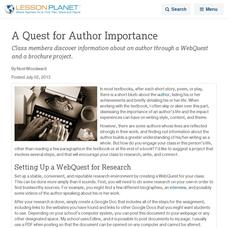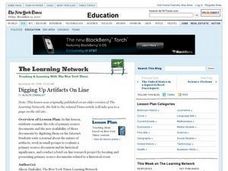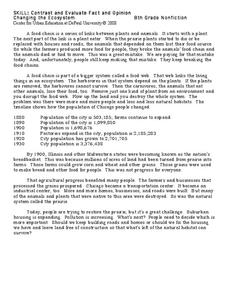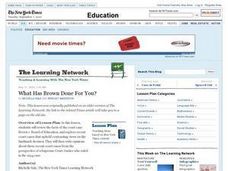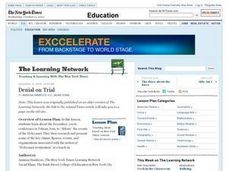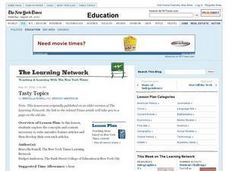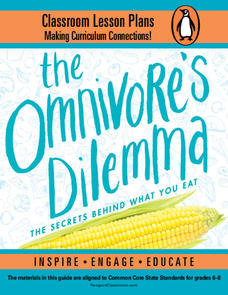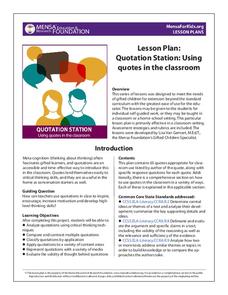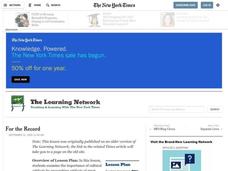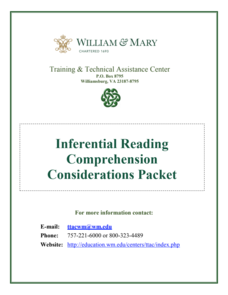Curated OER
A Quest for Author Importance
Class members discover information about an author through a WebQuest and a brochure project.
Dream of a Nation
Creating Awareness through Action Oriented Writing and Research
Middle schoolers aren't too young to feel strongly about politics, social issues, consumer rights, or environmental problems. Demonstrate the first steps toward social change with a project about action-oriented writing. Eighth graders...
Curated OER
Digging Up Artifacts On Line
Why is it important to preserve historical documents and artifacts? Examine the role of primary source documents and the availability of these documents on the Internet. Middle and high schoolers write a journal about the nature of...
Curated OER
In God We Trust; All Others Pay Cash
Learners review their knowledge on the First Amendment. After reading an article, they identify specific church and state issues. Using the Internet, they research President Bush's proposal from a specific point of view. They summarize...
Crafting Freedom
Frances Ellen Watkins Harper: Lover of Literacy
This, the sixth in a series of 10 related resources, examines the life and works of Frances Ellen Watkins Harper, an African American author, born in 1825, who advocated literacy for both free and enslaved African Americans.
Curated OER
Current Event Project
One of the best ways to make history relevant and engaging is to analyze current events before they become history! Check out these project guidelines for a current event research paper, outlining the major required sections of the...
Newseum
Persuasion Portfolios
After class members brainstorm a list of current social and political issues, groups each select a different topic from the list to research. Teams create a portfolio of at least 10 examples of stories about their issue, stories that...
DePaul University
Contrast and Evaluate Fact and Opinion
How can you tell when an author is expression an opinion or stating a fact? Use two short reading selections to emphasize the difference between a statement that you can prove and one that you can't. The first passage explains food...
EngageNY
Analyzing the Model Essay: Studying Argument
Scholars begin writing an argument essay based on Shakespeare's A Midsummer Night's Dream. They read and analyze a model essay, considering the author's thinking before writing it.
Curated OER
Is That a Fact?
Investigate popular scientific claims and gather evidence to defend or argue against an author's stance. Writers synthesize information and compose their own "Really?" columns modeled after those found in the weekly "Science Times"...
Curated OER
What Has Brown Done for You?
Learners review the facts of the court case Brown v. Board of Education. Next, they research recent court cases that uphold contrasting views on the landmark decision. They write opinions about these recent court cases from a 1954...
Curated OER
Denial on Trial
What is the "Faurisson Affair”? What is “Holocaust Revisionism”? What does freedom of speech entail? Do revisionists have a right to voice their ideas? Such questions are at the heart of a richly detailed, thought provoking lesson...
Curated OER
Diving into Iceland's Genetic Pool
Investigate ethical issues surrounding the Decode project in Iceland. Middle and high schoolers take the positions of the Icelandic government, scientific researchers, and citizens and defend or refute the Decode project in a Reykjavik...
Curated OER
Who Could Have Been Who
Can word choice affect a candidate's likeability? Use a New York Times lesson to explore how a presidential candidate's likeability factor can fluctuate in public opinion polls. Young readers choose a presidential election from their...
Curated OER
Tasty Topics
Students analyze a graphic from an article and predict what the article might be about. After reading an article, they discover a journalist's experience of traveling across the United States to compare fast food restaurants. They...
Curated OER
What a Relief!
How are disasters addressed by the Federal Government? This New York Times lesson, based on the article "Disaster Aid: The Mix of Mercy and Politics," prompts middle schoolers to discuss the idea of using a disaster declaration as a...
Penguin Books
The Omnivore’s Dilemma, Young Readers Edition
As the saying goes, you are what you eat. A useful set of lesson plans encourage young readers to take a second look at their eating habits. Pre- and post-reading questions bring in reflective writing and discussion while extension...
Curated OER
Let There Be Peace: Nobel Prize Winners
What is the Nobel Peace Prize? After they establish criteria for great leadership, secondary learners read a New York Times article about President Jimmy Carter's acceptance of the Nobel Peace Prize in 2002. Individuals research the...
MENSA Education & Research Foundation
Quotation Station: Using Quotes in the Classroom
An informative list compiled with quotes, authors, and discussion questions, along with 20 out-of-the-box application ideas, make up the collection of lessons geared to spark dialogue and creative thinking about quotations.
Curated OER
For the Record
Students read a New York Times article in order to examine the importance of cultural artifacts. They create essays from the point of view of one cultural artifact to demonstrate the knowledge they gained by doing research.
National Council of Teachers of English
Timelines and Texts: Motivating Students to Read Nonfiction
With the emphasis on incorporating more nonfiction in language arts classes the question arises about how to design activities that motivate kids to engage with informational text. How about an assignment that asks class members to...
Washoe County School District
Eyewitness to the Holocaust
Scholars investigate the Holocaust through the eyes of an Auschwitz survivor. They analyze and research a firsthand account of events inside the gas chambers moments before hundreds died. Using Holocaust Reading Passages and...
University of Pennsylvania
Decoding Propaganda: J’Accuse…! vs. J’Accuse…!
Reading snail mail is a great way to go back into history and to understand others' points of view. The resource, the second in a five-part unit, covers the Dreyfus Affair. Scholars, working in two different groups, read one letter and...
William & Mary
Inferential Reading Comprehension Considerations Packet
Don't forget to read between the lines! Educators learn tips and activities to help scholars learn to infer to increase reading comprehension. Activities suggested include think alouds, backwards words, and who's who. the packet includes...
Other popular searches
- Author Research Report
- Author Research Projects
- Favorite Author Research
- Author Research Rubric
- Author Research Papers
- Author Research Cubes
- Author Research Powerpoint
- Author Research Bookmarks
- Researching an Author
- Research on a Community Author
- Favorite Author Research Paper
- Author Research Language Arts


